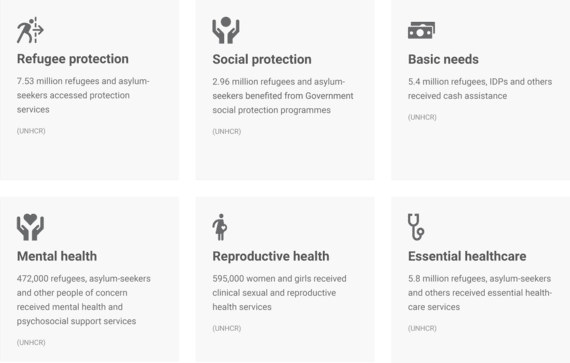Reaching more people with quality aid
In 2022, the UN and partner organizations aimed to assist 216 million people through 35 country plans and 8 regional plans. This equated to an 18 per cent increase in the original number of people targeted for assistance at the beginning of 2022, largely driven by the combined effect of climate change, the war in Ukraine, economic shocks and growing food insecurity. Of all people targeted by plans at country level, 157 million of those people (79 per cent) benefited from at least one form of aid during the year.
Humanitarians invested in understanding the needs of affected communities, listening to their priorities and feedback to adapt their response: 14.9 million people used feedback mechanisms to share their concerns, make complaints and ask questions. And when financial assistance was expressed as the most pressing need, humanitarians adapted, for example by providing multipurpose cash assistance to 4.2 million Ukrainians.
People reached in HRP countries
Bridging gaps in food security and nutrition
Faced with rising hunger across the globe, humanitarians took action to fight food insecurity, preserve lives and livelihoods, and limit the adoption of negative coping mechanisms. People facing acute food insecurity received time-sensitive food aid and cash assistance. At the same time, families received emergency agriculture and livelihoods support, enabling them to produce their own food. This diversified nutrition and boosted resilience. In the Horn of Africa, the desert locust surge was finally declared over, thanks to rapid anticipatory action and quick responses to livelihood losses.
Food
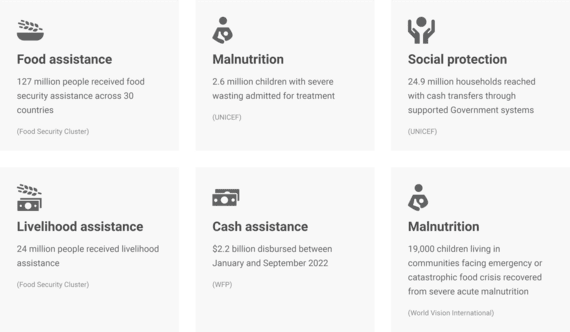
Inclusive health care
Faced with a continuing and complex health crisis, humanitarian partners worked on all fronts to respond to the COVID-19 pandemic, ensure the maintenance of essential health services, and respond to new cholera and Ebola outbreaks. Emergency health assistance reached 40.3 million people in the first half of 2022.
Humanitarian actors stepped up to mainstream and improve mental health care in emergency operations, providing 2 million mental health-related consultations in 2022 – a vital service when depression and anxiety affect one in five people in emergency and conflict situations. Partners prioritized the provision of child and maternal health, with more than 17 million children and women accessing primary health care in UNICEF-supported facilities in 2022. Humanitarians also ensured that people with disabilities had adequate access to humanitarian assistance and care, including physical rehabilitation and psychological support.
Health
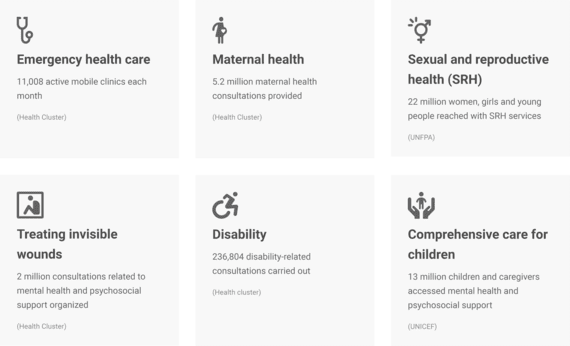
Multisectoral humanitarian assistance
In 2022, humanitarians provided food, health care, dignified shelter, basic non-food items (NFIs), and safe water, sanitation and hygiene. Assistance was designed and adapted across different sectors to reach the increasing number of people forced to flee their homes and becoming displaced in host communities or camps. The Camp Coordination and Camp Management (CCCM) Cluster and partners provided 9 million displaced people with assistance. Rural communities living in hard-to-reach areas were also prioritized. For example, in Afghanistan’s Badghis Province, 195,000 people accessed clean water.
Access to education remained a priority to ensure future opportunities for boys and girls. Schools also provide an entry point for additional support, such as protection screening, hygiene training, health check-ups and nutritious food.
Multisector
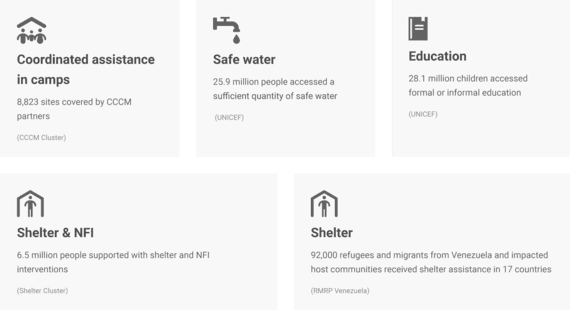
Protection
Humanitarian organizations provided holistic protection services, including GBV interventions, legal aid, mine action services and psychological support.
Protection
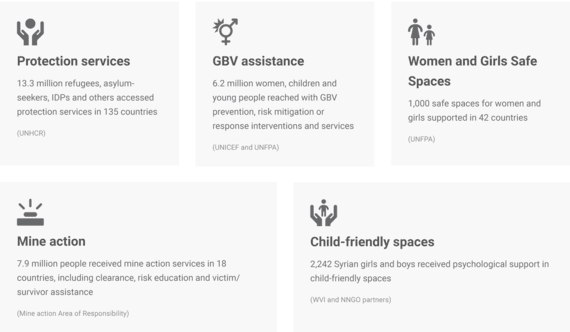
Protection and assistance to refugees under regional plans
A record number of people are fleeing their country to seek safety. Regional plan partners worked together to help refugees, migrants and host communities to meet their basic needs. Protection services, life-saving relief items, safe drinking water, and health and cash assistance were provided in 46 countries.
Protection and assistance to refugees under regional plans
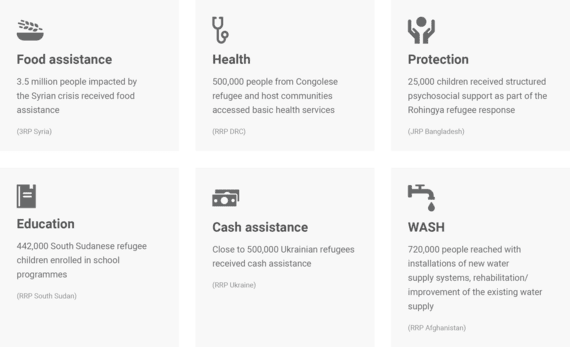
Safe, coordinated and efficient response
Humanitarian operations depend on a range of coordination and support services to identify, access and help crisis-affected people, including in hard-to-reach areas. Efficient communication and transportation are critical to ensuring humanitarian safety, enabling security and medical evacuations, and connecting humanitarians when no other reliable systems are available. The Logistics Cluster provided 149 humanitarian partners with transport services, enabling the dispatch of 24,778 MT of humanitarian cargo to 300 locations.
Safe, coordinated and efficient response

Multisectoral support to refugees
As crises become increasingly complex and protracted, fewer refugees can return home, and they continue to live in crowded conditions with limited access to water, sanitation and health facilities. The humanitarian system has provided key services to support refugees, almost half of whom are women and girls.
Multisectoral support to refugees
